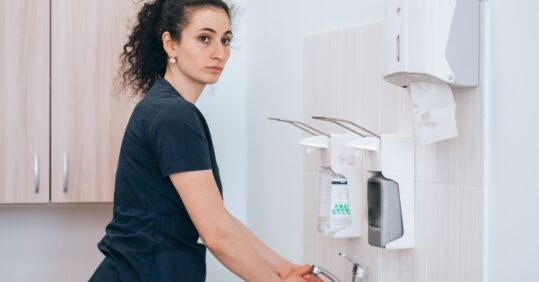Less than 1% of government’s 50K more nurses are GPNs

The government is today celebrating the recruitment of over 50,000 more nurses working in England, but figures show the total only includes 361 additional general practice nurses (GPNs).
The numbers also include a decline in health visitors and learning disability nurses, while latest vacancy data also shows nursing vacancies across the NHS remain over 42,000.
Data published today by NHS England showed the government has met its manifesto pledge for 50,000 more registered nurses six months earlier than its initial target of March 2024.
The number of nurses has increased by 51,245 from September 2019 to September 2023 – up from 300,904 to 352,149.
However, when broken down by settings, the data set showed an increase of just 361 GPNs over the last four years.
This represented a workforce rise of only 2% – from 16,352 GPNs in September 2019 to 16,713 in September 2023.
Related Article: New preceptorship package for social care nurses
Overarchingly, it also translated to less than 1% of the government’s 51,245 additional nurses.
Lee Collins, a GPN in Cornwall, told Nursing in Practice that not enough action had been taken to retain nurses in general practice.
‘If the government had put policies in place to retain existing GPNs, then the figures would look much better than they do now. However, retainment statements don’t look “sexy” enough for the government,’ he said.
Mr Collins warned ‘many older and very experienced GPNs’ were leaving practices due to retirement and the uptake of ‘alternative and subsidised’ Additional Roles Reimbursement Scheme (ARRS) positions.
‘The issue is multi factorial, but despite the GPN role being pivotal in general practice, voices are often left unheard,’ he added.
Meanwhile, Ali Nixon, a GPN in Lincolnshire, cited the ARRS scheme and pay, terms and conditions within primary care as key challenges with nurse recruitment.
‘I have been a GPN for many years and really enjoy my job, working with like-minded nurses to provide care for the patients, who you get to know, but I don’t think that I would come into primary care now from an [NHS] Agenda for Change contract unfortunately,’ she told Nursing in Practice.
Ellen Nicholson, co-chair of the Royal College of Nursing’s GPN Forum, added that she was ‘pleased to see the rise in overall nurses, however the proportionally small increase in GPNs seems to show a lack of investment and understanding of the care provided by nurses in general practice’.
Related Article: Applications to study nursing in England at ‘new low’
‘More national recognition, targeted recruitment and retention of GPNs, investment and fairer terms and conditions would go someway to improving the recognition and of the invaluable GPN roles,’ she told Nursing in Practice.
Across other settings, the data revealed the number of health visitors had decreased 20% from September 2019 to September 2023 and the number of learning disability nurses had fallen by 5% in the same period.
Meanwhile, the number of community nurses and children’s nurses had increased by 12%, and adult nurses were up by 22%. The number of mental health nurses in England had also risen by 11%.
RCN chief nurse Professor Nicola Ranger said: ‘Nursing staff will reject government claims that it is ‘mission accomplished’ on nurse recruitment – this political target had no basis in the reality of demands on health care.’
Pointing to new data also released today, which shows nurse vacancies across the NHS remain high at 42,306, she warned: ‘There are still tens of thousands of nursing vacancies in the NHS.
‘On every shift nursing staff are caring for too many patients. They’re spread perilously thin leaving patients waiting longer, and unable to provide the outstanding care that they want to.’
In addition, Professor Ranger warned the NHS Long Term Workforce Plan would ‘remain a pipedream without proper investment and critical detail on how it will be achieved’.
Related Article: Paul Rees appointed as permanent NMC chief executive and registrar
‘Nursing staff won’t tolerate a status quo of low pay and endlessly increasing demands,’ she added.
Making the announcement today, health and social care secretary Victoria Atkins, said: ‘There are 50,000 extra nurses in the NHS caring for our loved ones, delivering extra appointments and improving access for patients.’
Highlighting the training ambitions of the NHS workforce plan, she added: ‘We have delivered on our promise, but we won’t stop here.’

See how our symptom tool can help you make better sense of patient presentations
Click here to search a symptom




